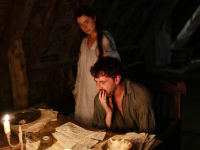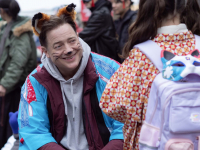 Written by the author of Moneyball and from the director of Anchorman, The Big Short tackles the true story of the financial crisis. But does it follow in Wolf of Wall Street’s footsteps or is it all together more serious?
Written by the author of Moneyball and from the director of Anchorman, The Big Short tackles the true story of the financial crisis. But does it follow in Wolf of Wall Street’s footsteps or is it all together more serious?
The Big Short follows some of the more auspicious minds at the time of the world financial crisis that hit around 10 years ago. The key players are a series of investment bankers and hedge-fund managers, who by accident or genius spotted the shiny surface of the financial housing bubble.
Set in motion by Michael Burry (Christian Bale) an opening was created to profit on the unimaginable, an opening Mark Baum (Steve Carrell) and the small two man investment firm Brownlow could not help but fall through. The rest, unfortunately, is not quite history.

Gosling, Carell, Pitt and Bale all star.
Adam McKay directs a stellar cast, with all and none a standout role. From the reclusive Ben Rickert (Brad Pitt) of very few words to the all too vocal Mark Baum, there is no moment where the actor overcasts their character. The characters are no heroes but neither are they villains, their humanity and the jaw-dropping fallibility of our human nature can only leave you unsettled. There are no catchphrases or one-liners to play on your emotions, only the truth, which as quoted in the film ‘is like poetry and everyone hates poetry’.
So it is to McKay’s credit on making such a festering eyesore of truth so creatively palatable and understandable. The beguiling feminine presence of Margot Robbie and Selena Gomez are welcome additions to the camera, although the insinuation that the men wouldn’t understand otherwise seems a little derogatory.
Filmed using offices and a computer screen as the major backdrop, Big Short won’t be the most visually stunning of the year. That being said it did use the breaks from the office to good effect as it panned through the barren suburbia, or slid a brief frame of homeless people across the screen. These glimpses of the reality that for the most part were hidden from the dwellers in the high offices, act as a clever reminder of the ignorance, not malice, which permeated the banking society.
The Big Short feels very much like a documentary at times, with the odd witty aside from the actors to inform us when the material gets too dry that they could not help but spice it up a bit. This self-awareness is an interesting twist, which may divide opinions, yet given the incredulity of some of the situations, the clarification of reality only adds to the potency of the plot.
All members of the cast performed with equal prowess (as you might expect), however Bale was at his best with a subtle and convincing characterisation of Burry. The mannerisms and physical attributes that could so easily have been overplayed for effect, were notably only touched on enough to create a believable persona. Mirroring Bales performance, The Big Short captured reality while ignoring the Hollywood blockbuster that it could have been. Clearly this year is a good vintage for biopics.
Author – Joe, Bath store






